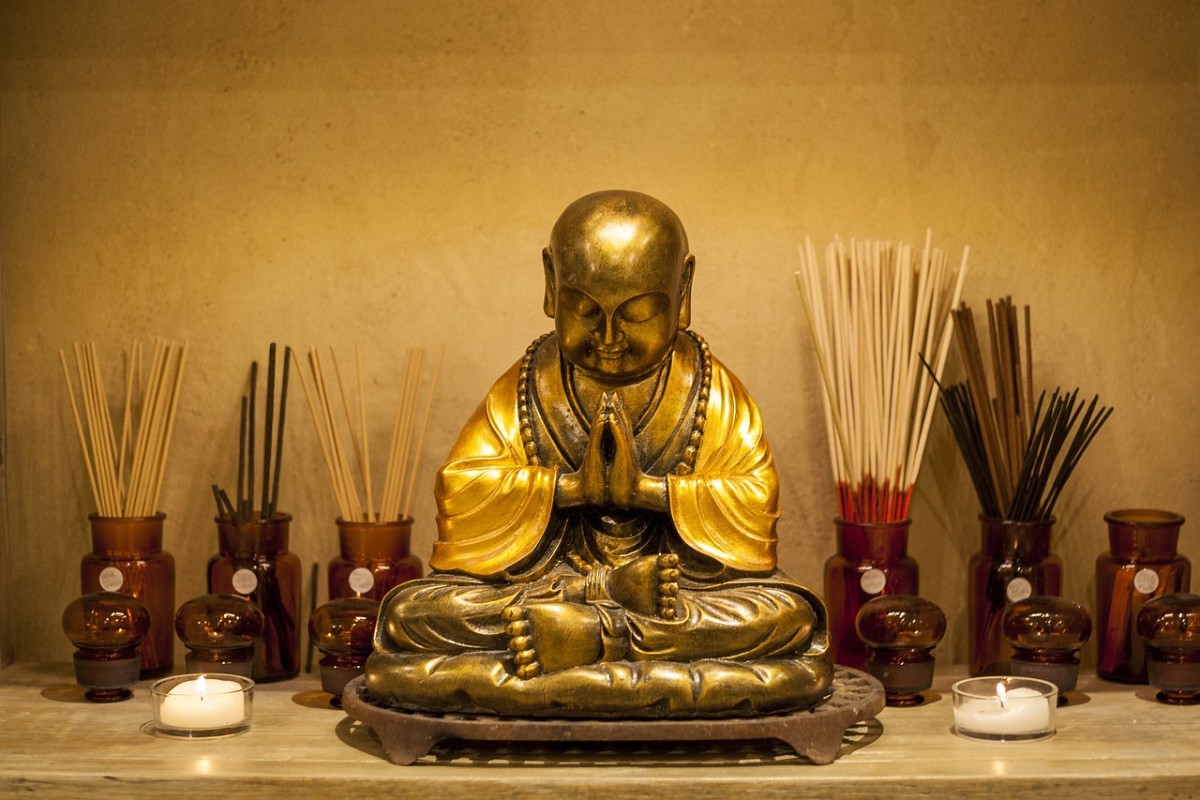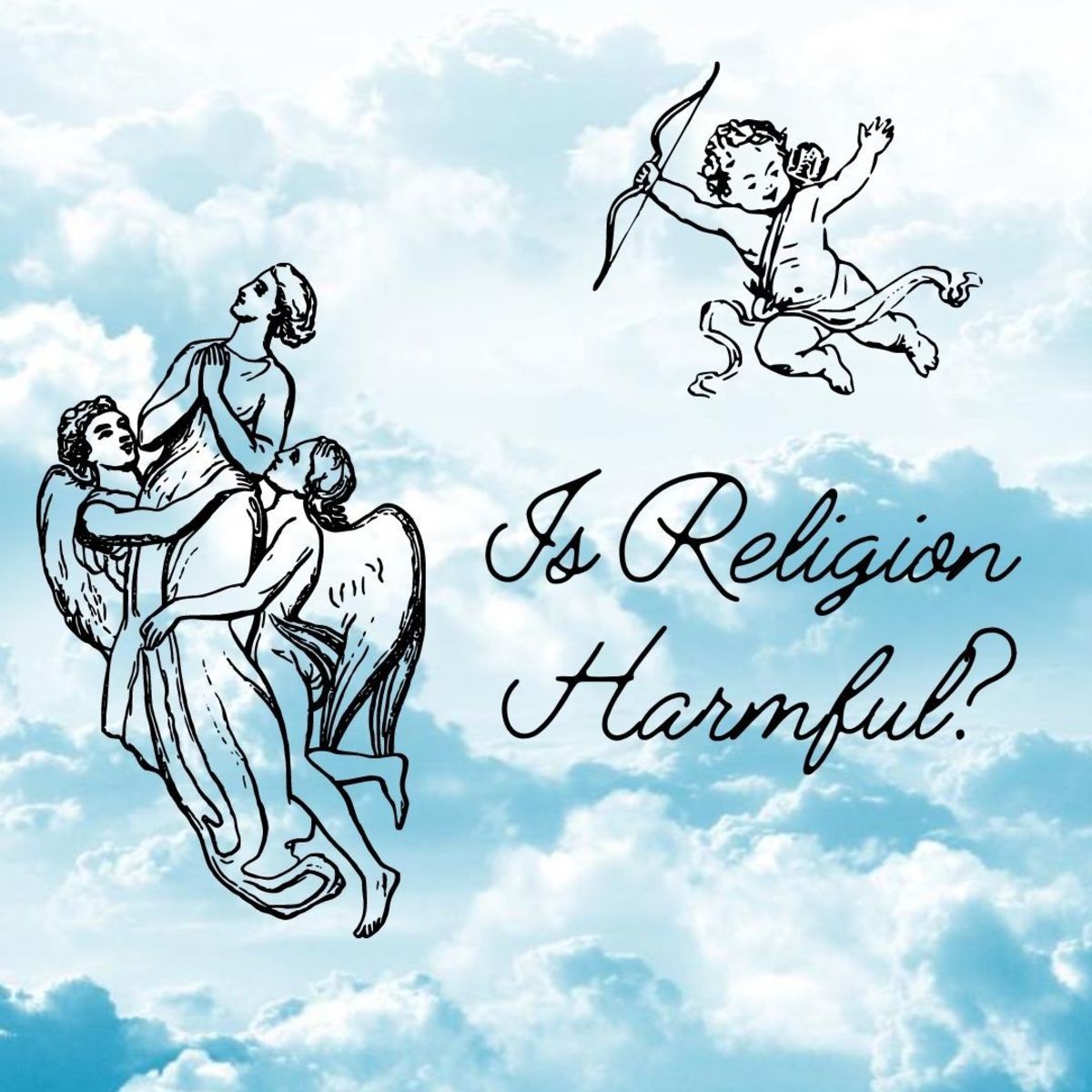What Takes More Courage Than Rebellion? Considering Another Point of View. Part IV: Combined Religions
The preceding hub explored Far East Asian religions. To access it, please visit this link:

My previous three hubs have explored basic religions and their offshoots. Perhaps there were some you discovered had profound meaning. Then again, maybe you liked some aspects of each of them, but could not take on the entire religion as your own. How to deal with the latter situation? How about combining religions? Hey, that’s an idea! Just take the best from each one and create your own mode of worship!
There are two major world religions that do this. I will explore them here.

Sikhism.
Basic Philosophy: "God loves every one of us; for Him there is no Hindu, no Muslim; all of us are His children, hence, equal human beings." ~ Shri Guru Nanak Dev, in his first sermon.
As you can tell by the above quote, Sikhism is a combination of Hindu and Islam, though it believes all religions hold validity. It combines the political, secular, and the sacred, and firmly supports equal rights for both genders; all are equal in God’s sight. It supports earning a n honest living without resorting to exploiting others, and leading a life that is creative, active, and practical. It promotes the values of fidelity, truthfulness, purity, and self-control.
The Five Thieves – ego, anger, attachment, greed and lust – must be brought under control. The result of not doing this is separation from God (this can be remedied by intense and relentless devotion). The world is currently experiencing the Age of Darkness because too many people have not brought these Five Thieves under control. The soul goes through several reincarnations before it becomes a human being; mankind’s ultimate goal is to be totally united with God.
Sikhism prohibits:
-
Cutting hair or shaving. Hair is seen as a gift from God; since God made people this way, it is not their place to alter the way they look.
-
Consuming alcohol, drugs and tobacco (marijuana and hash are ok for meditative purposes)
-
Superstitious rituals. This includes pilgrimages, circumcision, fasting, ritual purification, idol worship, and veil-wearing by women.
-
Obsession with material goods and wealth
-
Sacrificing animals
-
Life as a beggar, recluse, monastic or yogi. The ideal lifestyle involves family, and living as “saint soldiers”.
-
Negative talk, such as lying, bragging, slander, and backstabbing.
-
Priestly class. This was done away with by the 10th Guru of Sikkhism
-
Eating ritually-killed meat. Some sectors prohibit eating meat altogether.
10. Committing adultery.
Type
| Monotheistic. God goes by many names; the main one is Naan. God is a spirit with no gender; formless, unknowable but familiar.
|
Holy Book
| The Gurū Granth Sāhib, also referred to as the Ādi Granth (literal meaning is, The First Volume). It was created by Guru Arjan in 1604. The Gurū Granth Sāhib is the final version of the scripture created by Guru Gobind Singh.
|
Other sources of scriptures such as the Dasam Granth and the Janamsakhis., exist; however, there is a running debate whether or not they can be considered as actual scripture.
| |
House of Worship, Day of Worship, Typical Worship Service / Rituals and Celebrations
| The Sikh house of worship is called a temple. It has no clergy; they were done away with by Guru gvind Singh, the 10th Guru. There is the position of Granthi; the Granthi looks after and reads from the Guru Granth Sahib, the Sikh Holy Book. Any Sikh can aspire to obtain the position of Granthi.
|
Sikhs have no specific holy day; they visit temple for worship early morning before sunrise, and after sunset every day. Worship involves singing, chanting, reciting the 5 prayers, and meditation. A Granthi reads from the Guru Granth Sahib, and meals are prepared in the communal kitchen which is present in every Sikh temple.
| |
Sikhism has three major holidays: Baisakhi (also known as Vaisakhi), which honors Khalsa established by Guru Gobind Sinh in 1699 (April 13th); Gurpurbs, which honors the birthdays of the 10 Gurus; the entire Sikh scripture is read by a team of readers within 48 hours; and Diwali, which is Festival of Lights, held in November, which celebrates the 6th Guru Amritsar’s return from jail in 1620; it involves fireworks, and the lighting of clay lamps after sunset.
| |
Estimated Year Founded
| 1500 CE
|
Founder / Central Figure(s)
| Shri Guru Nanak Dev Ji
|
Country of Origin
| Batala, Pakistan
|
Countries Where Practiced
| Worldwide. The largest communities of Sikhs can be found throughout India, though they comprise only about 2% of the population there. Sikh communities are also located in Canada (mostly in British Columbia, and Ontario), East and, West Africa, the Middle East, Southeast Asia, the United Kingdom and the United States. Smaller populations are found within many countries in Western Europe, Mauritius, Malaysia, Fiji, Nepal, China, Pakistan, Afghanistan, Iraq, Singapore, and Mexico.
|
Percentage / Numbers of World Population Practicing It
| 23 million (0.36%). It is the 5th largest religion in the world.
|
Number of Denominations
| There are three. Udasi consists of holy men who remain celibate and either wear yellow robes or go nude. They rely on donations for their living, carrying a begging bowl. Similar to Hindus, they serve as missionaries. Keshadharis are militants who carry weapons, defending their religion at any attack. Sahajdharis have rejected militant living, and live regular lives following Sikh tenets.
|
Story
| FIRST GURU: Shri Guru Nanak Dev Ji (1469 – 1539) had always been fascinated by religion. Barely into his teens, his landlord noticed he had unique divine qualities, and encouraged him to explore the world, to learn about religion and cultures. Sikhism officially began at the time when he, at 30 years of age, went for his morning bath, and disappeared for 3 days. It was assumed he had drowned, but he returned, and made his famous proclamation, “There is no Hindu, there is no Muslim”. He ultimately went on 5 journeys, spreading the teachings of Sikhism, based on visions he had which rejected the caste system and idol worship. Each journey encompassed thousands of miles; east (Assam / Bengel), south (Tamil Nadu / Andhra), north (Tibet. Kasmir, and Ladakh), and west (Mecca and Baghdad). His 5th and final journey led to the Ravi River, where he retired. Nine other Gurus followed him.
|
SECOND GURU: Guru Nanak appointed Lahina to succeed him, shortly before he died. Lahina became known as Guru Angad. He standardized the Gurmukhi script used in Sikh sacred scripture.
| |
THIRD GURU: Guru Amar Das took this post at age 73, in 1552. He promoted equality for women, doing away with brutal rites such as sati (widows burning themselves on their husbands’ funeral pyre). He also established langar, the communal kitchen that is now present in all Sikh temples. As the religion grew, he trained 146 apostles to handle the different aspect of it; 52 of them were women. After serving for 22 years, he appointed his son in law Jetha to take his place before he died.
| |
FOURTH GURU: Jetha took on the title Guru Ram Das. He established the city of Ramdaspur, which was later renamed Amritsar.
| |
FIFTH GURU: Guru Arjan, the youngest son of Guru Guru Ram Das, took over his post. He assembled the first scripture, then known as Adi Granthy (literal meaning, The First Book), including writings from the previous 4 Gurus and various Muslim and Hindu saints. He died a martyr’s death for including information in the scripture that was opposed by the government.
| |
SIXTH GURU: Guru Har Gobind carried two swords; miri for spiritual, and piri for the temporal nature. He believed both were inseparable, especially after the inhumane way his predecessor was put to death. He established an army to protect Sikh interests.
| |
SEVENTH GURU: Guru Har Rai developed and strengthened the army established by his predecessor, so the Sikh community could better resist the oppression of the Mughal Empire in which it existed.
| |
EIGHTH GURU: Guru Har Krishan became known as “the Boy Guru”, since he acquired that status at only 5 years of age. He strove to ease suffering of commoners during a smallpox outbreak during that time; unfortunately, he died from that disease 3 years later, at age 8.
| |
NINTH GURU: Guru Tegh Bahadur served at the time the Mughal Emperor of India wanted to eradicate Hinduism and establish Islam as the only religion. Since Sikhism is a combination of both, this also included the Sikh community. The Guru refused; as a result, he was imprisoned and eventually beheaded in 1675, becoming the second martyr in the religion.
| |
TENTH GURU: Guru Gobind Singh, the son of Guru Tegh Bahadur, was moved to establish a strong community of Saint Soldiers. He led several battles against the Muhgal Empire. His most famous quote is, “When all peaceful means of resolution have failed, it is righteous to draw the sword.” He gave the Sikh scriptures its final revision, adding his father’s writings to them. He himself wrote 1400 pages, but they are included in a separate book, the Dasam Granth. Guru Gobind Singh died in battle in 1708, but his influence, along with his predecessors, continues to this day.
| |
Over the ensuing century, Sikhs continued to battle against the prevailing empire, until they were able to establish their own in 1801, with its base in Punjab. This empire fell in 1849; at that point, Sikhs began to migrate to various countries throughout the world.
| |
How the World Began
| God willed the entire cosmos into creation, billions of years ago. This is not the first time He has done this, and neither will it be the last. Maya, which is enticement, attachment and the false belief of eternal reality, keeps people from being one with God.
|
What Happens After We Die
| Sikhism believes in reincarnation. After death, the soul enters another body, and in some instances, another realm which could be heaven (oneness with God) or hell separation from God). Only evil people need fear death.
|
How the World will End
| God is constantly creating. He can choose to destroy the world and re-create it at any time. It is foolish to try to calculate when that will happen; that time and effort is much better spent making the most of your life here on Earth.
|
Positive Aspects
| Sikhism treats people of both genders and all races and classes equally. They are strong believers in action as well as prayer and meditation. They have a good understanding and full acceptance of various religions, and promote knowledge, sharing, and community cohesion. Because of their emphasis on communal living, even the poorest societies can meet the needs of all its members.
|
Negative Aspects
| Since Sikhism tends to focus on the practical. It frowns on following fads, or excessive display. Some people, especially youth, may find their lifestyle stifling. Sikh communities frequently keep to themselves; thus, little is known about them, and therefore they are often negatively depicted in the media. This lack of knowledge about them has also led to persecution of communities wherever they exist; people think Sikhs are Muslims, and that, along with their willingness to defend themselves when attacked, leads others to mistake them for an Islamic cult.
|
Modern Day Issues
| Sikhs are having a difficult time keeping their youth congregation, due to its rather austere lifestyle and strict rules. In order to adapt to modern society, it will need to revamp its regulations on subjects such as birth control (currently, the religion is against it) and divorce (it is allowable only under the most extreme circumstances). Community members also have a lot of work to do to promote awareness about their religion. Currently, many Hollywood films depict Sikhs in an inaccurate and negative light; this promotes persecution. Bolllywood films, which are made in Mumbai, are working to dispel negative myths.
|
Famous Sikhists
| Dalip Singh Saund, the first Indian to be elected to US Congress; Milkha Singh (“The Flying Sikh”), track and field athlete who won the Olympic Gold medal in 1958 and 1962; Andrew Kooner, Bantamweight Champion Boxer of Canada; Harmeet Singh, defensive midfielder in football; Pamela Rai, 1984 Olympic Bronze Medal winner in swimming.
|

Baha'i Faith
Basic Philosophy: “The Earth is but one country, and mankind its citizens.” ~ Baha’u’llah.
Baha’i Faith is an independent religion that draws on the teachings of Judaism, Christianity, Islam, Hindu and Buddhism. They believe all religions are true. Knowledge sprang and evolved in various parts of the world according to the needs of the people there. Religious leaders Krishna, Zoroaster, Abraham, Moses, Jesus, Mohammed, Gautama Buddha, Bab and Bahalluah (the Nine Houses of Faith) all brought messages from God; Baha’i unites all these teachings together into one. God is Unknowable, but the prophets from all religions the world over and throughout time help us to understand Him better. Its code of ethics most closely resembles Islam, though it is against jihad (holy war). They are encouraged to pray and meditate every day. Their prayers can be a pre-written one by Baha’u’llah, or can be spontaneously theirs.
Baha’is commit themselves to bring about a world that promotes gender equality, has an even distribution of wealth, education for all, agreement between religion and science, balance of nature and technology, and is free from prejudice in all forms. When this has been accomplished, they hope to establish one world government where all can live in unity and harmony.
Type
| Monotheistic
|
Holy Book
| The Kitab-i-Aqbas, written by Baha’u’llah
|
House of Worship, Day of Worship, Typical Worship Service / Rituals and Celebrations
| Baha’is call their church a House of Worship. Only 7 exist throughout the world; they are in New Delhi, India; Apia, Samoa; Panama City, Panama; Sydney, Australia; Kampata, Uganda; Frankfurt am Main, Germany; and Wilmette, IL, USA. As a result, most worshippers gather at each other’s homes. Their Sabbath is once a month; since their calendar month lasts 19 days, they gather once every 19 days for a “Feast”. Their services consist of devotional reading, prayer, and singing. Afterwards they discuss and vote community issues. It concludes with a social potluck. Baha’is have no clergy; the council members in the Universal House of Justice in Haifa, known as the Spiritual Assemblies, dictate religious authority.
|
Most important holidays are the Baha'i New Year, which is the spring equinox, and the Ridvan Festival which runs from April 21st through May 2nd. The Ridvan Festival celebrates the time Baha’u’llah declared his mission to the world in 1863.
| |
Estimated Year Founded
| 1863 CE
|
Founder / Central Figure(s)
| Baha’u’llah
|
Country of Origin
| Persia (Modern day Iran). Baha’u’llah received His vision while exiled in Constantinople.
|
Countries Where Practiced
| 200 countries and territories throughout the world, most of them developing and non-Muslim, since they are persecuted in Muslim countries. India, USA, Iran and Viet Nam have the largest populations. It is the second most widely distributed religion in the world, next to Christianity.
|
Percentage / Numbers of World Population Practicing It
| 0.1% (7 million). It is the world’s 7th most practiced religion.
|
Number of Denominations
| One
|
Story
| In 1844, a merchant named Siyyid ‘Ali-Muhammad had a divine vision which he revealed to the world. It was a message that was to bring in a new age of peace and justice to humanity. This would be accomplished by uniting all world religions into one. He stated he was the prelude to an even more powerful prophet. This prophet was Baha’u’llah. He was born to a wealthy family, but was more interested in helping the poor than living a life of luxury. His teachings and efforts to unite all religions caused him to be imprisoned for over 40 years, during which he received many divine revelations and wrote the Kitab-i-Aqbas. He died in exile, after which his son Abdu’l-Baha spread it throughout the Ottoman Empire. After his death, the religion resorted to administrative leadership. Its headquarters are located in Haifa, Israel.
|
How the World Began
| The world has always existed in one state or another, and always will exist. At one time, Baha’i supported the creation story of Adam and Eve, but has rejected it as myth since science has revealed the Earth is far more ancient than 6000 years old. They believe science and religion must always agree.
|
What Happens After We Die
| Baha’i beliefs about life after death are vague. Bahalluah believed that the soul after death cannot be described, but in essence, heaven and hell are defined not as places but as distance between oneself and God. After death, the soul journeys on various planes, drawing closer to God in the process. People who lived unevolved (evil) lives on Earth remain distant; thus, they are in hell.
|
How the World will End
| The world has always existed in one state or another, and always will exist.
|
Positive Aspects
| Baha’ism places great emphasis on non-prejudice and equality of all peoples regardless of race, income, and gender. It espouses healthy and wholesome living, and promotes world peace in a way that all live in one big, loving community. It takes the best from each of the religions it is combined from, and blends all of them into one faith.
|
Negative Aspects
| Baha’ism tends to be authoritarian and bureaucratic. Though it accepts all people, having only one denomination, it doesn’t allow much for free thought and individual opinions. Because of these characteristics, it could easily turn into a mass cult, in spite of its high idealism (most cults start off with high ideals).
|
Modern Day Issues
| Currently, Baha’i is one of the fastest growing religions in the world. People are especially attracted to its goal of uniting all nations as one, and everyone being equal, with no prejudice or class systems. It also has a very high satisfaction rate; few people leave. Baha’is involve themselves in politics, preserving the environment, and bringing about world peace.
|
Famous Baha’ists
| Seals & Crofts, musicians (of “Summer Breeze”, “Diamond Girl”, and “Get Closer” fame); Dizzy Gillespie, jazz trumpeter; Carole Lombard, actress; Fariborz Sahba, architect of the Lotus Temple terrace gardens of Haifa, Israel; Arvid Nelson, writer of comic books and Rex Mundi creator.
|
In these 10 religions, founded throughout different ages from various countries, have you noticed how much they have in common? All seek enlightenment, and attempt to explain how the world works and how to live the best life here. Ultimately, they're more alike than different.
Here are additional factors to consider: some believe that during the 18 years of Jesus’ life on which the Bible remains silent, He may have journeyed to India and Tibet to study Hinduism and Buddhism, which explains why Christianity contains a lot of their philosophies. There is also a theory that Jesus may be a reincarnation of former great religious leaders, such as Gautama Buddha and Confucius. Most conservative Christians reject both concepts; however, the Bible backs them up. Regarding the first, Jesus states that He has sheep “not of this fold” (John 10:16); that means they must practice religions other than Judaism. Regarding the second, here is an example of reincarnation (Malachi 4:5 and Mark 9:13).
In the three months it took for me to study and write these hubs, I have discovered a third lesson in addition to the two learned from being in a cult; the Laws of Cause and Effect apply to everyone, regardless of their belief system and degree of devotion to it. What’s harmful about rebellion is that many people dump the positive teachings of their religion, and their lives go down the tubes as a result. I did this. Fortunately, my revolt didn’t result in addictions; however, I did neglect to form social networks necessary for success in the working world, which is why I got a poor start in adulthood. This led to me having multiple nervous disorders, culminating in three breakdowns. It also made me a poor friend to have. The last fact embarrasses me; that is why I have dedicated my HubPages account to promoting beneficial lifestyles. It is also why I don’t advocate dissenting against any religion, whether it be yours or someone else’s. Considering another point of view may be much scarier, but ultimately it is a superior choice.
I have come to the conclusion that all religions are simply ancient science. They developed according to the environment, culture, and experiences of people who lived in various lands throughout the world. All are true, and all are cults; the difference is in how they’re practiced. The major danger is declaring any one to be Absolute Truth, since no one can really know; we have been left to figure out everything for ourselves. Some religions have provided leaders who are more enlightened than average, but none are perfect.
Modern scientific discoveries have explained phenomena and produced cures, doing away with the necessity for religious "miracles". Whether religion is obsolete or not, today it is more important than ever people learn to overcome their prejudices and get along and share, since technology has made the whole world one giant neighborhood.
Let us celebrate our differences, and...

References
http://en.wikipedia.org/wiki/Sikhism
http://www.gurmat.info/sms/smsarticles/gurunanaksakhis/neitherhindunormuslim/
http://www.realsikhism.com/index.php?subaction=showfull&id=1248364871&ucat=7
http://www.faithology.com/sikhism/overview
http://sikhismisfun.wordpress.com/different-denominations-of-sikhism/
http://www.allaboutsikhs.com/home
http://sikhism.about.com/od/questionsaboutsikhism/qt/Sikh_Day_of_Worship.htm
http://en.wikipedia.org/wiki/Bah%C3%A1'%C3%AD_Faith
http://www.religionfacts.com/bahai/fast_facts.htm
http://carm.org/a-brief-history-of-the-bahai-faith
http://www.answers.com/Q/Baha'i_day_of_worship
http://en.wikipedia.org/wiki/Bah%C3%A1'%C3%AD_Faith_and_science
http://en.wikipedia.org/wiki/List_of_Bah%C3%A1'%C3%ADs
http://www.bahai.org/faq/facts/bahai_faith
© 2014 Yoleen Lucas








